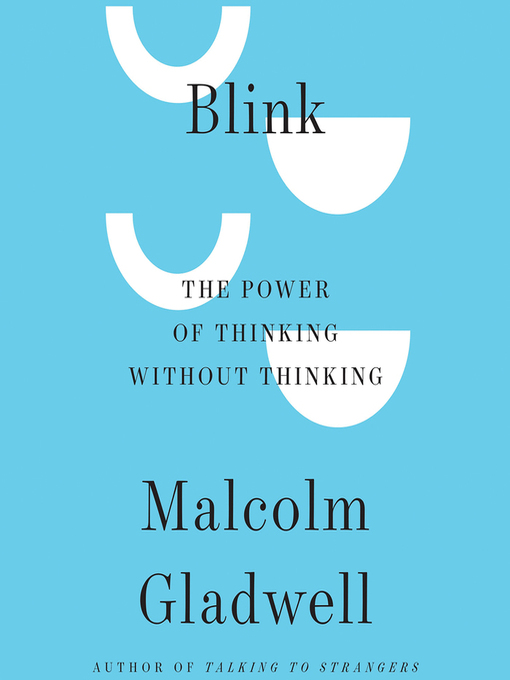
Blink
The Power of Thinking Without Thinking
فرمت کتاب
audiobook
تاریخ انتشار
2006
Lexile Score
1100
Reading Level
7-9
ATOS
8.3
Interest Level
9-12(UG)
نویسنده
Malcolm Gladwellناشر
Hachette Audioشابک
9781594831706
کتاب های مرتبط
- اطلاعات
- نقد و بررسی
- دیدگاه کاربران
نقد و بررسی

Have you ever wondered why love at first sight, so seemingly ill-advised, sometimes works out for the long-term? Malcolm Gladwell may have the answer. In BLINK, Gladwell asserts that snap judgments can quite often be as good as decisions made cautiously and deliberately. Using a wide variety of examples--an ex-Marine's victory in a war-game simulation, a museum's purchase of a bogus statue, an emergency room's method for diagnosing heart attacks--Gladwell asks us to step back from overly analytical decision-making and trust our instincts and experience. Like his previous work, THE TIPPING POINT, BLINK is a thought-provoking, category-defying book. The audio is read by the author with care and conviction. R.W.S. (c) AudioFile 2005, Portland, Maine

Starred review from November 1, 2004
Best-selling author Gladwell (The Tipping Point
) has a dazzling ability to find commonality in disparate fields of study. As he displays again in this entertaining and illuminating look at how we make snap judgments—about people's intentions, the authenticity of a work of art, even military strategy—he can parse for general readers the intricacies of fascinating but little-known fields like professional food tasting (why does
Coke taste different from Pepsi?). Gladwell's conclusion, after studying how people make instant decisions in a wide range of fields from psychology to police work, is that we can make better instant judgments by training our mind and senses to focus on the most relevant facts—and that less input (as long as it's the right input) is better than more. Perhaps the most stunning example he gives of this counterintuitive truth is the most expensive war game ever conducted by the Pentagon, in which a wily marine officer, playing "a rogue military commander" in the Persian Gulf and unencumbered by hierarchy, bureaucracy and too much technology, humiliated American forces whose chiefs were bogged down in matrixes, systems for decision making and information overload. But if one sets aside Gladwell's dazzle, some questions and apparent inconsistencies emerge. If doctors are given an algorithm, or formula, in which only four facts are needed to determine if a patient is having a heart attack, is that really educating the doctor's decision-making ability—or is it taking the decision out of the doctor's hands altogether and handing it over to the algorithm? Still, each case study is satisfying, and Gladwell imparts his own evident pleasure in delving into a wide range of fields and seeking an underlying truth. Agent, Tina Bennett.
(Jan. 13)
Forecast:
A 25-city tour (including several university towns) should introduce Gladwell to new readers and help sell out the 200,000-copy first printing.

December 1, 2005
Gladwell ("Tipping Point") discusses how some decision-makers make successful and sometimes unsuccessful snap judgments without a lot of information. Using a large variety of examples, including marriage studies, malpractice insurance studies, test-taking results, and police shooting investigations, he explores the decision-making process. The book is broken down into three sections: the strategies involved in making conscious, well-researched decisions and those involved in unconscious, quick decisions; a discussion of how these quick decisions can be unconsciously skewed by prejudices, stereotyping, or personality traits; and using police training examples to illustrate how it is possible to consciously train yourself to make better snap judgments. A solid addition to any public or university library psychology collection." -Beth Traylor, Univ. of Wisconsin -Milwaukee Libs."
Copyright 2005 Library Journal, LLC Used with permission.

September 1, 2004
Gladwell writes about subtle yet crucial behavioral phenomena with lucidity and contagious enthusiasm. His first book, " The Tipping Point " (2000), became a surprise best-seller. Here he brilliantly illuminates an aspect of our mental lives that we utterly rely on yet rarely analyze, namely our ability to make snap decisions or quick judgments. Adept at bridging the gap between everyday experience and cutting-edge science, Gladwell maps the "adaptive unconscious," the facet of mind that enables us to determine things in the blink of an eye. He then cites many intriguing examples, such as art experts spontaneously recognizing forgeries; sports prodigies; and psychologist John Gottman's uncanny ability to divine the future of marriages by watching videos of couples in conversation. Such feats are based on a form of rapid cognition called "thin-slicing," during which our unconscious "draws conclusions based on very narrow 'slices' of experience." But there is a "dark side of blink," which Gladwell illuminates by analyzing the many ways in which our instincts can be thwarted, and by presenting fascinating, sometimes harrowing, accounts of skewed market research, surprising war-game results, and emergency-room diagnoses and police work gone tragically wrong. Unconscious knowledge is not the proverbial light bulb, he observes, but rather a flickering candle. Gladwell's groundbreaking explication of a key aspect of human nature is enlightening, provocative, and great fun to read. (Reprinted with permission of Booklist, copyright 2004, American Library Association.)

























دیدگاه کاربران